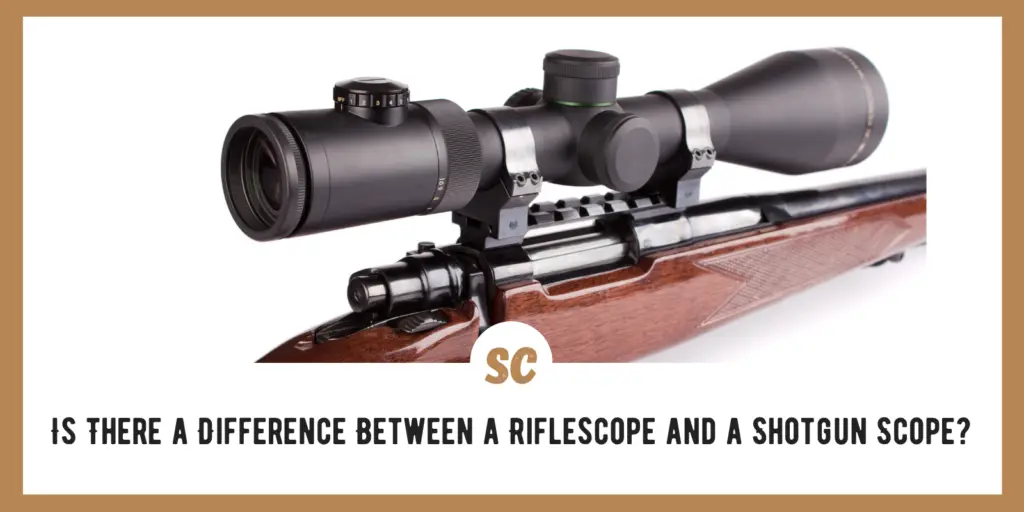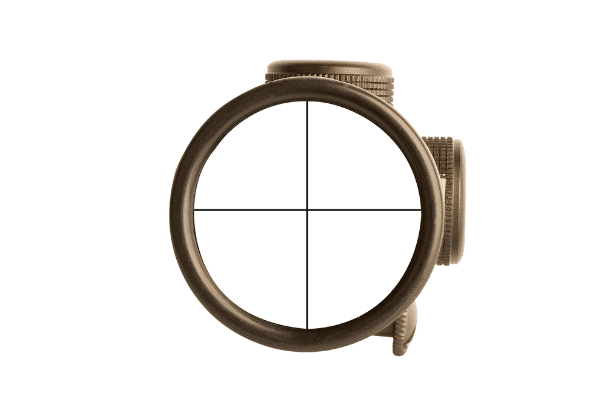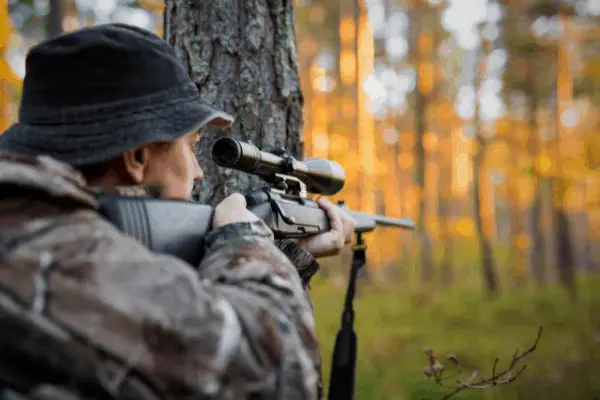Many places require hunters to use a shotgun for hunting deer and other similar-sized game animals. Typically, hunters in these areas use shotguns fitted with slug barrels or with special rifled barrels. Many hunters who routinely use a shotgun for deer mount a scope on their shotgun. Many wonder about the difference between riflescopes and shotgun scopes.

Shotgun scopes differ from riflescopes in two main ways. Riflescopes typically come from the factory, with the parallax set between 100 and 125 yards. On the other hand, shotgun scopes usually come with the parallax set at 75 to 100 yards. Eye relief is also an issue. Shotgun sights usually have a much longer eye relief than riflescopes.
The differences in rifles and shotguns drive these differences in riflescopes and shotgun scopes. Understanding how rifles differ from shotguns, apart from the obvious, is the key to understanding and choosing the right shotgun scope for your firearm.
SKIP AHEAD
Rifles and Shotguns: Same Principles but a Different Approach
Both rifles and shotguns depend on the same principles of physics. Confine a burning substance in a sealed space, and as the pressures build that something will move. In the case of a rifle or shotgun, that something is the bullet or shot in the cartridge.
Physics also says that for every reaction, there is an equal and opposite reaction. This reaction force is known as recoil, and we have all experienced it. Some people don’t realize that a 12 gauge shotgun one-ounce slug packs almost the same recoil as a 250 gn 340 Wby Mag rifle.
The Effects of Recoil: Rifles Vs. Shotguns
Just like recoil on a large caliber rifle, a shotgun pounds your shoulder, and that energy transfers to the scope. Most rifles deliver a rather mild recoil compared to a 12 gauge shotgun. Mounting a scope meant to withstand the 17.1 ft. lbs. of recoil energy of a .270 Weatherby Mag on a 12 gauge shotgun that delivers 54 ft. lbs. of recoil energy, and you can understand why the scope might fail.
This greater recoil energy demands a beefier and more durable construction for shotgun scopes to ensure their survivability for repeated use. Consequently, shotgun scopes are designed differently than riflescopes to withstand these greater forces.
The Factor of Distance
Rifles shoot further than shotguns. That is a given based on their design and intended uses. This distance factor is another reason for differences in riflescopes and shotgun scopes. All traditional riflescopes suffer from parallax> Parallax at great distances can cause the reticle and the target to seem out of focus.
On most riflescopes, the parallax adjustment is set to between 100 and 125 yards. At this distance, the reticle and your target are in the same focal plane. Since most game animals in the United States are taken at these ranges, this factory setting works well.
However, shotguns have a much shorter range. Typically, game animals hunted with a shotgun are taken between 75 and 100 yards. For this reason, the parallax on most shotgun scopes is set for these same distances.
A Matter of Eye Relief
The other big difference between shotgun and rifle scopes is the eye relief distance. The eye relief on most riflescopes falls between 3.4 and 3.9 inches. The recoil of most modern hunting rifles makes this distance safe and convenient for mounting and proper position when holding the rifle.
Shotguns tend to have much harder recoil and having your eye less than four inches from the eyepiece of a scope can leave you with some unwanted memorabilia from your hunt. The impact of the metal eyepiece with your eyebrow, cheek, or heaven forbid, your eyeball can be catastrophic.
For this reason, shotgun scopes typically have a longer eye relief than riflescopes.
Other Differences Between Riflescopes and Shotgun Scopes
There are some other minor differences in shotgun scopes compared to riflescopes to consider. Some of these differences are noticeable, and some not so much. It is important to be aware of these more subtle differences.
Shotgun Reticles vs. Riflescope Reticles
Shotgun scopes reticles are much simpler reticles than riflescopes. In some cases, red dot scopes work well for shotgun scopes because of the shorter distances involved. Shotgun scope reticles lack many of the finer graduations than riflescope reticles.
At the shorter distances where most shotgun scopes are used, bullet drop compensation is not needed. Most hunters using shotguns with scopes don’t make windage and elevation adjustments in the field.
Field of View Differences
Shotgun scopes tend to have a wider field of view than comparable riflescopes. In the field, the shorter ranges to targets are one reason for this difference. In addition, many times, hunts where shotguns are used are in densely wooded areas.
In wooded areas, the ability to track and follow fast game animals through heavy brush is a plus. Having a wider field of view allows a hunter to keep game in the field of view of the scope easier.
Magnification
No one would expect to take 200-yard shots with a barreled slug shotgun. Consequently, there is little need for higher magnifications on a shotgun scope. Higher magnifications such as those found on riflescopes intended for high-power long-range hunting rifles are unnecessary.
However, many shotgun scopes are available with some magnification. Mostly this is for those of us whose eyesight as we age just doesn’t work as well as it once did.
How Do I Choose a Shotgun Scope?
If you are hunting with a barreled slug shotgun, then you are probably contemplating adding a scope. There are some things to consider as you shop for your new shotgun scope. Finding the best fit for your shotgun, your style of hunting, and the game you are pursuing is important.
Durability
Shotgun hunting usually takes you into some rough country and some extreme conditions. In addition to the intense recoil shotguns can impart, these environmental and terrain challenges need to factor into your decision.
Shotguns scopes are usually built with these extremes in mind. However, lower price scopes or scopes from little known manufacturers may be labeled as shotgun scopes but not with the higher level of ruggedness you might expect.
Shopping for a quality scope usually means sticking to the more well-known manufactures in the shotgun scope industry.
Accuracy
One of the main reasons we mount a scope to our shotgun is to improve our accuracy. What a waste of time or money if the scope you choose doesn’t improve your accuracy but becomes a liability. A poorly chosen scope or an inaccurate scope is worse than no scope at all.
Even a slug-barreled shotgun needs to be accurate. You owe it to yourself and to your target to place your shots precisely and cleanly. Having confidence in the accuracy of your shotgun and your shotgun scope is as important as almost anything else.
Price
Few of us aren’t affected by price. We almost all have budgets and must make our hunting purchase decisions within that budget. Finding the best balance of features, durability, and price is always the goal. There are many great shotgun scopes on the market in almost every price range. Doing your diligence in comparing these different scopes will ultimately leave you with the best scope for your needs and expectations.
Check out these Top 3 Shotgun Scopes Recommendations from our Firearm Expert.
Other Options for a Shotgun Scope
Think past the traditional crosshair and optical scope. New technologies in the optics market are affecting shotgun scopes, just like riflescopes. New options are coming online almost weekly. Some of the more popular new options include:
- Red dot scopes – Instead of a traditional reticle, red dot scopes are becoming more and more popular among shotgun shooters. These non -traditional scopes allow hunters different options. Red dots a said to be quicker on target acquisition and much more useful in close quarters.
- Holographic sights – Holographic sights are not as popular with shotgun shooters. Using a holographic sight often requires hunters to retrain themselves for a different style of shooting. Holographic sights are typically aimed with both eyes open. Aiming with both eyes open has advantages for shotgun hunters by giving them a wider field of view in their peripheral vision.
- Infrared and night vision scopes – Night vision optics are the most technologically advanced scopes that are now being mounted on shotguns. Two types prevail in this category. The traditional night vision scopes that rely on light-gathering technology to produce an intensified image at night are popular. Infrared technology that sees heat instead of light is the most technologically advanced form of night vision. The downside to these non-traditional scopes is the cost of the technology.
Finding Your Scope for Your Shotgun
With a greater understanding of the differences in scopes for shotguns and rifles, you should be better able to decide which shotgun scope is best for you. Remember that scopes, like your rifle or shotgun, are tools to perform a job. Chose the best tools for the job at hand will make the job easier and the outcomes satisfying and productive.



